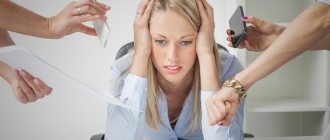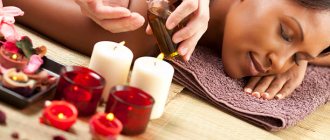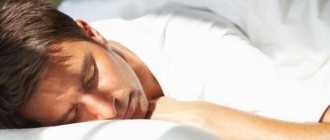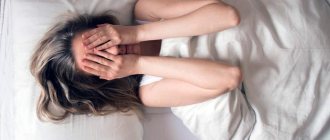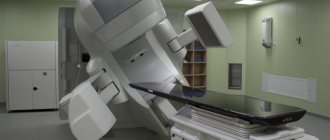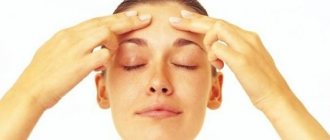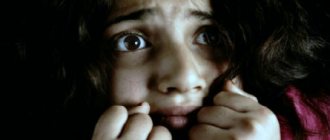Folk remedies for insomnia during menopause
Treatment of insomnia that occurs during menopause is possible without the use of sleeping pills.
Traditional medicine has in its arsenal a huge number of recipes that will help eliminate an unpleasant symptom without harm to the body. And this applies not only to decoctions or infusions based on medicinal herbs, but also to alcoholic extracts of medicinal plants. What folk remedies for insomnia during menopause can be used? Below are several effective recipes that will help you forget about the unpleasant symptom of menopause.
Motherwort
Motherwort is a medicinal herb that has a sedative, hypnotic, and hypotensive effect. To eliminate insomnia during menopause, you can make either decoctions or infusions from it, or take it in the form of an alcohol extract. The tincture can be purchased at any pharmacy, it costs approximately 25 rubles.
To prepare the medicine you need 1 tbsp. l. Brew dry leaves of the plant with a glass of boiling water and leave covered for a quarter of an hour. Then strain the finished medicine, squeeze out the cake, and if necessary, bring the infusion to its original volume with boiled water.
How to combat insomnia during menopause using this folk remedy? The infusion should be taken 1 tablespoon three times a day. The course of treatment can be continued for several weeks, after which you can take a ten-day break, and then, if necessary, you can resume taking motherwort infusion.
With drops everything is simpler. The finished alcoholic extract is drunk 15-20 drops before meals. Reception can be done in the morning and evening.
Valerian
If a woman does not know what to do with sleep disorders during menopause, then valerian can help get rid of the problem. This is a medicinal herb that has a depressant effect on the central nervous system, due to which a sedative and hypnotic effect is achieved.
It is recommended to prepare a decoction from the roots of valerian. To do this, you need to pour 1 heaped spoon of chopped roots or rhizomes of the plant with 2 cups of boiling water and put on low heat. Boil the mixture for 7 minutes, then remove from heat, cool and filter. Take the prepared decoction, one third of a glass, 2 – 3 times a day.
The tincture of this medicinal herb is drunk 20 drops 2 – 3 times a day. Tablets – 2 pieces at a time. The frequency of application is identical to that described above.
Peony tincture
Peony is a truly miraculous plant that is used in many areas of medicine. Neurology and gynecology are no exception.
The tincture of this plant is especially necessary for women during menopause, since under the influence of this herb normalization of sleep occurs, stabilization of the psycho-emotional state, and improvement of the functioning of the endocrine system. Moreover, peony has a beneficial effect on hormone balance, preventing hot flashes and hormonal surges.
But it should be remembered that this plant is poisonous, so it is extremely important to strictly adhere to the dosage of the alcohol extract. It is 30 drops per day
The drug is taken after meals, preferably before bedtime. You can continue treating insomnia during menopause with peony tincture for no longer than a month, after which you must take a ten-day break, and then, if necessary, start taking the medicine again.
Herbal mixture to normalize sleep during menopause
It is very useful to make different herbal infusions from several types of medicinal plants. They are much more effective in helping to combat sleep disorders, irritability and other unpleasant symptoms that trouble women during menopause. The recipe for one of these medicines is given below.
It is necessary to mix lemon balm leaves, peppermint leaves and chamomile flowers in equal proportions. Pour a tablespoon of the mixture into a glass of boiling water, then leave for half an hour under the lid. The result is not even an infusion, but an aromatic and tasty tea, which you need to drink in one sitting, after carefully straining it. You can drink this drink twice a day - morning and evening.
A combination of folk remedies or sleeping pills with aromatherapy, meditation, massage, and relaxing baths is very useful. You can do such procedures every day, alternating them with each other. This will make it much easier to deal with insomnia and irritation during menopause.
The article was checked by an expert - practicing family doctor Elizaveta Anatolyevna Krizhanovskaya.
Symptoms
Insomnia is a sleep disorder in which a person is unable to get adequate rest. In the morning he does not feel rested, irritability and appetite disorders appear. The quality of sleep deteriorates.
Insomnia is also characterized by restless and anxious sleep and constant dreams.
Signs of insomnia during menopause:
- constant night awakenings;
- early awakenings;
- difficulty falling asleep;
- drowsiness and irritability during the day;
- poor concentration during the day.
Let's look at ways to treat sleep disorders during menopause.
Traditional methods
There are a huge number of traditional methods for treating insomnia during menopause. Products prepared on the basis of medicinal plants act as gently as possible on the body, so the risk of side effects in this case is minimal.
It is worth noting that to get good results, folk remedies need to be used for a long time, so a woman must be patient.
In severe cases, folk remedies for insomnia during menopause cannot be used as the main treatment, but they can complement drug therapy. This will help speed up the healing process.
Chamomile
Tea with chamomile helps to relax, reduces nervous tension and anxiety. You need to prepare the medicine in the same way as regular tea. To improve the taste of the product, you can add honey, milk or cinnamon to it.
Ginger
A tincture of ginger and fennel will not only help relieve excess nervous tension, but also improve the functioning of the digestive system.
The tincture is prepared as follows:
- dry ginger root and fennel are crushed into powder and mixed in equal proportions;
- 1 tbsp. l. powder is poured into 150 ml of boiling water;
- the product is infused for an hour.
This tincture should be drunk before bedtime (1 hour before) 1 tbsp. l.
Hop
Hawthorn berries and hop cones need to be crushed into powder, and then mixed in equal proportions. Then you need to pour 1 tbsp. l. prepared powder with a glass of boiling water. It is better to prepare the medicine in the morning so that it has time to infuse by the evening. It is recommended to drink 100 ml of the decoction before bed. The throats should not be too large.
St. John's wort
St. John's wort and lavender need to be crushed. Then you should mix 1 tbsp. l. herbs and pour 400 ml of boiling water over them. The product must be infused for at least 2 hours. The finished medicine is filtered through gauze folded in several layers and taken 1 tsp before bed.
Review of medications for insomnia
Let us immediately note that pharmaceutical medications for insomnia during menopause, if taken uncontrolled or incorrectly, can cause a number of side effects. Therefore, their use should be carried out with caution, especially when self-medicating.
Below is a brief overview of drugs that have hypnotic and sedative effects. They may vary in composition and form of release, therefore they have different contraindications for use, side effects and characteristics of administration.
Barboval
One of the most popular and effective sedatives and sleeping pills that can be used to combat insomnia during menopause in women is Barboval.
Contains the active substance phenobarbital, and is dispensed in the form of drops or tablets for oral administration. Prescribed for mood swings, causeless irritation, insomnia (including menopause), tachycardia. Taking the medication is prohibited in case of individual intolerance to its components, bradycardia, renal or liver failure, severe arterial hypotension, obstructive syndrome, etc.
Important! Barboval is strictly contraindicated for the treatment of insomnia and mood swings if the period of menopause in women is accompanied by depressive conditions. It doesn’t matter how deep and prolonged the depression is.
The drug is usually taken in a dose of 10 - 15 drops (or a tablet) 2 - 3 times a day. Since the drops have a specific smell and taste, it is recommended to take them with a piece of sugar or a small amount of water. The course of treatment can last no more than 2 weeks.
Somnol
Somnol is a hypnotic and sedative medicine containing the active ingredient zopiclone. Dispensed in the form of tablets for oral administration. Prescribed for prolonged and severe insomnia.
You should not take pills to combat sleep disorders during menopause if there is hypersensitivity to zopiclone, respiratory failure, sleep apnea syndrome, severe or chronic phase of liver failure, myasthenia gravis.
If you snore in your sleep
To get rid of insomnia during menopause, Somnol is recommended to be taken in a dose of 7.5 mg, which is equal to 1 tablet per day. You need to take the medicine immediately before going to bed.
The duration of treatment for insomnia with Somnol is 2–3 weeks. But since during menopause this symptom may manifest itself more intensely, the course of therapy can be prolonged.
The prescription of medication, determination of the dose and duration of taking the tablets is carried out only by a neurologist. Somnol is a potent drug that can cause a number of side effects, and an overdose can lead to serious consequences.
Sondox
The sleeping pill Sondox is made based on the active ingredient doxylamine succinate. The medicine is indicated for the treatment of periodic or transient insomnia in different categories of patients, including women during menopause.
Contraindications to the prescription of the drug include hypersensitivity to its components and angle-closure glaucoma. Women suffering from respiratory problems should take the pills with caution.
The initial dosage of Sondox is 7.5 mg per day, which is equal to half a tablet. If this dose does not help eliminate insomnia, then it is doubled, bringing it to 1 tablet per day. The medication is taken immediately before going to bed. The duration of therapy can be a maximum of 5 days. If it is ineffective, the woman should seek further advice from her doctor.
Why do you have problems sleeping?
Menopause is one of the most unpleasant stages in the life of the fairer sex. Hot flashes, excessive sweating, a sudden feeling of irritation or causeless anxiety, decreased libido - menopause is accompanied by a number of manifestations that worsen the quality of life. This list also includes poor sleep, which is common during menopause. What causes insomnia?
Why does insomnia occur during menopause?
- A woman leads an unhealthy lifestyle. Smoking, drinking alcohol, excessive physical activity and disruption of work and rest schedules can affect the quality of sleep at any age. During the menopausal period, these factors are aggravating, because of them the already weakened female body reacts even more acutely to hormonal imbalance.
- Frequent urge to urinate. Due to drying of the mucous membrane and decreased functionality of the urinary system, ladies constantly feel discomfort in the delicate area. By night time, the feeling of burning, itching and the desire to recover only intensify. Frequent urge to go to the toilet makes a woman wake up up to 10 times a night.
- Unstable emotional state. Thoughts about irreversible aging make a woman nervous. Her self-esteem decreases due to external changes, interest in social life disappears, anxiety and often depression appear. Inner experiences prevent you from falling asleep and force you to wake up at night in a state of anxiety.
In addition to the reasons listed, the quality of sleep can be affected by:
- pain in the joints and lower abdomen;
- poor nutrition;
- snoring causing apnea;
- insufficient physical activity;
- excessive consumption of invigorating drinks.
What treatment do experts recommend for insomnia during any stage of menopause? The recommendations are aimed at normalizing sleep patterns before lack of sleep causes the development of pathological changes in the systems of the female body.
Methods for eliminating pathology
Insomnia due to menopause is a problem that requires constant correction. Treatment is carried out comprehensively using hormone replacement therapy, which compensates for the lack of female sex hormones.
Combining traditional and alternative medicine methods prescribed by a doctor will allow you to get the maximum effect.
Self-medication is contraindicated, as it can cause harm during menopause - a stressful state for the body.
Drug treatment
Official medicine offers two types of solutions to the problem: the prescription of hormone replacement therapy (HRT) to compensate for the lack of female hormones, which leads to stabilization of the body, as well as the use of sedatives and hypnotics to artificially create normal sleep. Medicines should be taken in a clear dosage prescribed by a doctor.
In case of severe disorders, narcotic drugs are prescribed, the disadvantages of which include the formation of drug dependence and the need to increase the dose. Their benefits include rapid inhibition of excitatory impulses in the brain, which ensures falling asleep within ten minutes and restful sleep throughout the night.
ethnoscience
Preparations of plant origin based on phytoestrogens have the properties of estrogens, which are similar in chemical structure and action, which have a positive effect on the female body during menopause. Cleverol is considered an effective medicine created on the basis of red clover extract, which eliminates hot flashes, insomnia, prevents cancer, has a beneficial effect on the cardiovascular system, and prevents the occurrence of osteoporosis. Phytoestrogens are found in wheat, barley, and soy, which are recommended to be consumed as an alternative to hormone therapy.
Folk remedies are effective for menopause due to the content of prototype hormones while simultaneously providing a sedative effect that helps normalize sleep. Medicines based on motherwort, mint, lemon balm, valerian, eucalyptus, hawthorn, and yarrow are used in the form of infusions and decoctions. They do not stop nerve impulses entering the brain, therefore they do not have a direct hypnotic effect, but serve as a means of calming the central nervous system.
To stabilize sleep, aromatherapy is used in the form of baths with the addition of lavender, rosemary and cypress oils. Warm milk with honey, drunk an hour before a night's rest, has a hypnotic effect.
Homeopathic remedies
Homeopathy remedies are not addictive, do not require increased dosage and do not have side effects. Available in specialized pharmacies without a prescription. The following common homeopathic medicines are distinguished:
- Amylenum nitrosum is a remedy used for severe confusion of thoughts, tachycardia and dizziness. Promotes full-fledged quality rest, recommended for shallow, superficial sleep, accompanied by profuse sweating and frequent awakenings. Relieves hot flashes, has a calming and sedative effect on the central nervous system.
- Passidorm is a drug recommended for problems falling asleep. Simultaneous consumption with alcohol enhances its effect and provokes an inadequate reaction of the body.
- Notta is a homeopathic medicine that is effective in eliminating signs of anxiety, panic, fear, emotional stress, and accelerating the process of falling asleep.
It should be remembered that any drug of homeopathic origin is not intended for continuous use for more than one month.
Lifestyle correction
The menopause period is a stage of additional stress on the body, so it is important to pay attention to a healthy lifestyle. Necessary:
- balance your diet;
- to refuse from bad habits;
- take walks in the fresh air;
- practice meditation and yoga;
- create maximum coziness and comfort.
The main task is to change the way of thinking, since negative thoughts materialize and also negatively affect the nervous system.
Drugs
There is a wide range of drugs on the pharmaceutical market that have a sedative effect. They have different compositions, indications, contraindications and costs. A doctor should prescribe to a woman which sedatives to use during menopause, based on the results of blood tests for hormones and examinations.
In case of mild neurosis during menopause, in order to eliminate irritability and fear of approaching old age, the woman is prescribed herbal remedies. In case of sleep disturbances with the onset of menopause or the appearance of insomnia, a woman is prescribed sedatives with sleeping pills.
If neurosis during menopause is of moderate or severe severity, then sedative herbal preparations will not cope; it is necessary to take tablets with synthetic active substances. When indicated, antidepressants are prescribed, and, if necessary, tranquilizers. Grandaxin is often prescribed, a tranquilizer that calms and relieves anxiety. We will briefly look at what sedatives you can drink during menopause to calm your nerves.
Atarax
Atarax is a drug with an anti-anxiety and mild sedative effect; the active substance is hydroxide dihydrochloride. Taking the drug helps get rid of the following symptoms of neurosis:
- states of anxiety and restlessness;
- increased irritability;
- unmotivated aggression;
- tense mental state;
- internal trembling.
Taking the drug significantly reduces the reaction rate. Therefore, it is not recommended to drive a car during treatment.
Afobazole
Afobazole is an anti-anxiety drug with an active substance – pronebenzodiazepine anxiolytic. Taking the medicine helps get rid of the following symptoms of neurosis:
- an anxious state, manifested in concern and bad premonitions;
- feelings of restlessness and inability to relax;
- tearfulness;
- timidity and various fears;
- insomnia and sleep disorders;
- irritability;
- weakening of memory;
- difficulty concentrating.
The drug is recommended for women who have asthenic personality traits: self-doubt, suspiciousness, anxiety, high vulnerability. Taking it does not cause drowsiness or impairment of the ability to concentrate.
Tenoten
Tenoten is a drug with anti-anxiety and sedative effects. The active substance is antibodies to the brain-specific protein S-100, which are affinity purified.
The drug helps get rid of the following symptoms:
- excessive irritability;
- anxiety;
- increased nervous tension;
- mood swings;
- memory loss.
After therapy, a woman will be able to bear emotional stress more easily.
Novocaine
Novacaine is used not only to eliminate painful sensations, but also for gynecological pathologies and during menopause. Taking the drug allows you to quickly dilate blood vessels and, as a result, eliminate the following symptoms of neurosis:
- tearfulness;
- anxiety;
- migraine and other types of headaches;
- sleep problems;
- memory impairment.
By taking the drug, a woman can get rid of hot flashes and pain in her internal organs.
Novacaine is administered intramuscularly 1 time every 2 days. The course of treatment consists of 12 injections. For the first injection, prepare a solution of 3 ml of novacaine 2% and glucose 5%. For each subsequent injection, the dose of Novacaine increases by 1 ml. After completion of therapy, symptoms usually disappear. If they still remain, the doctor may extend the treatment.
Grandaxin
Grandaxin is an anti-anxiety drug that shows good results for any nervous disorders. The active substance is tofisopam. The medicine eliminates the following symptoms of neurosis:
- state of anxiety;
- unreasonable fear;
- increased irritability;
- Bad mood.
The drug has many positive properties: it has practically no contraindications and is not addictive, even with long-term use.
Lerivon
Lerivon is an antidepressant that has an anti-anxiety and calming effect. It effectively relieves excess tension, reduces agitation, eliminates sleep disturbances due to various experiences and fights panic attacks. The drug reduces attention. Therefore, you should stop driving a car during treatment. Side effects from the use of the medicine are rare, so that they do not appear, it is recommended to completely stop drinking alcohol.
Fevarin
Fevarin is an antidepressant with the active substance fluvoxamine maleate. Its use allows you to get rid of the following manifestations:
- internal restlessness and tension;
- increased irritability;
- sleep disorders.
Taking the drug is incompatible with alcohol. The treatment does not affect the psychomotor functions necessary for driving a car, but causes drowsiness and therefore you should stop driving.
Paroxetine
Paroxetine is an antidepressant with the active substance of the same name. Prescribed for anxiety, fears and depressed mood. During treatment, you should completely avoid alcohol and not drive a car.
Fluoxetine
Fluoxetine is a safe antidepressant with a stimulating effect. It is indicated in a state of general weakness and weakness. When you take it, the feeling of hunger disappears and you want to constantly do something.
Cipralex
Cipralex is an antidepressant with the active ingredient escitalopram oxalate. Effectively eliminates anxiety, tearfulness, irritability. During treatment you should stop drinking alcohol.
Novo passit
Novo-Passit is a combined herbal preparation with sedative action. It has a rich composition. The active ingredients of the medicine are extracts of the following plants: valerian, lemon balm, St. John's wort, flowers and fruits of hawthorn, elder flowers, hops and passionflower. Taking it allows a woman to get rid of the following symptoms of neurosis that occurs during menopause:
- irritability;
- fears;
- anxiety;
- headaches;
- sleep disorders, including mild forms of insomnia;
- constant mental stress;
- state of constant fatigue.
Taking the drug normalizes heart function and prevents the development of osteoporosis.
Persen
Persen is a sedative drug containing the following active ingredients: extracts of valerian rhizomes and leaves of lemon balm and peppermint. Helps cope with increased nervousness, irritability and sleep disorders, including insomnia. The drug is prescribed for all degrees of neurosis severity.
Gelarium hypericum
Gelarium Hypericum is an antidepressant of plant origin, which contains one active substance - St. John's wort extract. The drug has a mild antidepressant effect. It relieves anxiety, irritability, aggressiveness well, and also reduces the intensity of perceived depression and apathy. The drug is not recommended for women with high blood pressure. During treatment, prolonged exposure to the sun should be avoided.
Belloid
Belloid is a sedative. It contains L-hyoscyamine sulfate, ergot alkaids and butobarbital. It is prescribed for neuroses with severe autonomic disorders and insomnia. It is not recommended to drink alcohol during treatment. You should also refrain from driving a car.
Klimaktoplan
Klimaktoplan is a homeopathic medicine prescribed when symptoms of menopause appear. It effectively eliminates such manifestations of neurosis: nervous tension, increased nervousness, sleep disturbances and insomnia, dizziness, rapid heartbeat. The woman will get rid of hot flashes and profuse sweating. The duration of therapy can be quite long. It is carried out until the symptoms disappear.
Reasons for destabilization of the psycho-emotional background during menopause
According to statistics, mental disorders during menopause occur in 8-15% of women. And this is not strange, given the complex of factors that cause depressive moods:
Physiological influence
Destabilization of hormonal balance and estrogen surges can greatly affect the psychological state. Many doctors are of the opinion that it is precisely such fluctuations that provoke menopausal disorders. The fact is that serotonin is responsible for a good mood, and its production in the brain is directly influenced by estrogen. A decrease in the level of this sex hormone provokes a decrease in serotonin, which causes sudden mood swings and depressive symptoms.
Psychological influence
Many women associate menopause with old age and loss of sexual attractiveness. Self-perception is disrupted, in which all age-related changes are perceived too harshly by a woman. And the unpleasant symptoms of menopause only complicate the situation, weakening the psyche. In addition, many people want to maintain a normal lifestyle, but with severe menopausal syndrome, this is very difficult to do. With constant hot flashes and disturbed sleep patterns, irritability and a sad mood increasingly occur. Even if there were no such disorders during reproductive age, the psyche in menopause still loses its natural protection.
Causes of sleep disturbance during menopause
Everything has its cause and its effect. Likewise, the appearance of sleep problems during menostasis does not appear out of nowhere and does not go away. What provokes this condition in women at this stage of life?
All the reasons for this problem can be divided into three groups:
- Hormonal reasons that are directly related to the biological metamorphoses occurring in the depths of the female body. An imbalance of female sex hormones provokes a lot of unpleasant symptoms that have a direct impact on the quality of falling asleep: attacks of night hot flashes, sweating, and episodes of increased heart rate. A decrease in the amount of estrogen provokes the development of snoring, and the appearance of short-term attacks of respiratory arrest - sleep apnea - often occurs. A decrease in the level of progesterone, one of the functions of which is to regulate the process of falling asleep, causes difficulties in this area.
- Psychological factors are inextricably linked with the first group. A woman involuntarily experiences the onset of menostasis. She is tormented by defenselessness in the face of threatening changes, the inability to stop them through her own efforts, she is involuntarily frightened by thoughts of approaching old age, frightened by the possibility of losing her attractive appearance and tormented by worries about her own health. All these negative thoughts may fade into the background during the daytime, but in the silence of midnight they reach gigantic proportions, preventing you from getting enough sleep.
- Additional reasons why insomnia develops during menopause may be:
- excess body weight;
- bad habits (alcohol and nicotine addiction);
- caffeine abuse;
- passive lifestyle;
- stress and anxiety;
- violation of the work and rest regime.
The dangers of insomnia
Poor night's sleep during menopause is a serious problem that, if left untreated, can lead to serious consequences.
The immune system
Insomnia has a bad effect on the immune system. The body simply does not have enough strength to withstand negative factors. It is during menopause that, more than ever, the ability of natural immunity to fully fight back against illnesses is important.
Vegetative manifestations
If a woman sleeps little, there is a risk of developing cardiovascular diseases. As a result, disturbances in the functioning of the heart occur, blood pressure increases, and vascular spasms occur.
If insomnia is episodic, then there is no potential threat to health, since a person’s general condition can be influenced by many reasons.
Psychological factor
Poor night's sleep negatively affects the performance of the nervous system, which is already under increased stress during menopause. Because of this, a woman becomes irritable, whiny and emotionally unstable. Since menopause occurs during a period when working life is not completed, the lack of proper rest provokes a decrease in performance and concentration.
What to do: treatment regimen
Insomnia therapy includes the use of various methods.
This is drug treatment, the use of traditional medicine, and alternative methods.
Most often, all of these techniques are prescribed in combination.
This allows you to achieve faster and more effective results.
Medications
Drug treatment of menopause during menopause involves the use of drugs from the following groups:
- Hormonal products containing female sex hormones (Remens, Qi-Klim). You need to take the drug 1-2 tablets (depending on the level of hormones), the duration of the course is no more than 1 month. The products are available without a prescription.
- Sedatives (Novo-passit). Take 1 tablet 3 times a day with sufficient liquid. The course of treatment is 2-3 weeks. Available without a prescription.
- Tranquilizers (Phenazepam). Take 0.5 - 1 tablet before bedtime. Duration of treatment – up to 2 weeks. Sold by prescription.
- Barbiturates (Meprobamate). Take 1-3 tablets before bed (dosage is calculated individually). Duration of treatment – no more than 1 month. Dispensed by prescription.
- Potent histamine blockers (Diphenhydramine). Take 1 tablet (50 mg) half an hour before bedtime. Duration of treatment – no more than 2 weeks. Dispensed by prescription.
Folk remedies
Traditional medicine recipes, used as a supplement to basic drug treatment, allow one to achieve a more pronounced therapeutic effect.
Of course, you cannot use them without a doctor’s prescription, as this can only aggravate the course of the disease.
The most popular recipes are:
Herbal decoctions of mint, rose hips, chamomile, thyme. All ingredients are mixed in equal proportions, 2 tbsp. the resulting raw material is poured into 0.5 liters. boiling water, leave for 10-15 minutes, take as a soothing tea before bed (you can add a small amount of honey for taste).
Hops infusion. Flowers and cones of the plant are poured with a glass of boiling water, left for 4 hours in a thermos, and taken ¼ glass before bed.
Warm milk with honey. Add 1-2 tsp to a glass of warm milk
honey, mix thoroughly, drink at night. It is important to remember that milk should be warm, not hot, since honey placed in a hot liquid releases carcinogens.
Rosemary tincture. 3 tsp
Leaves of the plant are poured with a glass of alcohol and infused in a dark glass container for 3 days. After this, the remedy is taken 15-20 drops in the evenings.
Unconventional methods and physiotherapy
Techniques such as massage, physical therapy, acupuncture and many other methods can improve a woman’s well-being and normalize her night’s sleep.
The following methods of therapy are distinguished:
Massage techniques help relax muscles, calm the nervous system, and normalize blood circulation in the body.
Movements should be as soft and slow as possible, paying special attention to the shoulder and neck areas. The duration of the procedure is 25-30 minutes.
Therapeutic baths with the addition of essential oils, sea salt, pine needle extract, restore blood flow, affect special receptors responsible for relaxing the body
The water temperature should be no more than 38 degrees, the duration of the bath should be 15-20 minutes.
Darsonvalization. The use of a special device helps eliminate vascular spasms, normalize blood and lymph flow, and the activity of the nervous system. The duration of the procedure is about 5 minutes, the course of treatment is 15-20 procedures.
Acupuncture. During the procedure, special thin needles are inserted into the biologically active currents (the diameter of the needle is so small that its use does not cause pain to the patient). Acupuncture sessions increase resistance to stress and normalize a woman’s emotional state. Session duration is 20-30 minutes, course duration is calculated individually.
It is important to remember that all of these procedures must be carried out by qualified specialists, because any error in the execution technique can lead to the exact opposite result.
Diagnosis and treatment
With the onset of menopause, vasomotor symptoms appear, which include hot flashes, increased sweating, headaches, and psycho-emotional symptoms - increased irritability, anxiety, mood swings, apathy, depression and neurosis. All symptoms appear due to hormonal changes occurring in the body associated with the cessation of hormonal function of the ovaries.
To eliminate menopausal symptoms, hormonal therapy is prescribed, and treatment of neuroses is carried out by a neurologist or psychotherapist. To understand how to calm a woman during menopause, a diagnosis is carried out, on the basis of which treatment is prescribed and the nerves are calmed. Depending on the stage of development of neurosis, sedatives or antidepressants are prescribed.
You should not self-medicate. Diagnostics includes psychological testing, pathopsychological examination and consultation with a psychologist. A comprehensive examination includes the identification of vascular disorders and somatic diseases. Only an experienced doctor will be able, based on the results of the examination and taking into account the psychological state of the woman, to select the optimal treatment.
Who to contact
Depression is characterized by emotional imbalance. Negative, sometimes aggressive thoughts become the main companions. This condition significantly worsens the quality of life, and in severe cases can lead to suicide. Therefore, at the slightest hint of mental disorders, you should consult a doctor.
There are a number of specialists whose visits are mandatory:
- therapist;
- endocrinologist;
- neurologist;
- cardiologist;
- psychotherapist.
The therapist is the starting point in the examination. Diagnosis of any illness begins with this doctor. The results of the tests prescribed by him allow him to accurately determine the problem, excluding other pathologies.
An endocrinologist is a specialist whose visits should become a habit, especially during menopause. Hormonal imbalance and problems with the thyroid gland are some of the main causes of depression. To exclude/confirm the disease, the doctor will prescribe certain tests.
A neurologist is a specialist who studies the state of the patient’s nervous system. After listening to complaints, analyzing the characteristics of symptoms and prescribing certain tests, the doctor diagnoses the problem or its absence.
A cardiologist is a doctor who excludes cardiovascular pathologies that cause changes in blood pressure. The occurrence of depression can be caused by malfunctions in the cardiovascular system, which are the norm or a disease during menopause.
A psychotherapist - his help will be required if all of the above specialists have not diagnosed pathologies that provoke depression.
Treatment options
If you are worried about insomnia during menopause, what should you do in this case? There are three groups of methods of disposal: non-medicinal, medicinal and folk. If you use them together, you can quickly eliminate this problem.
Non-drug treatments
Non-drug treatment includes fairly simple tips and rules:
- ventilate the room before going to bed;
- change bedding frequently;
- have a comfortable mattress and pillow;
- maintain physical activity;
- maintain proper nutrition;
- stick to a daily routine;
- To breathe fresh air;
- do breathing exercises;
- listen to relaxing music;
- take warm baths with aromatic oils before bed.
Such basic tips will help improve your well-being and relieve anxiety. With proper nutrition and normal physical activity, your figure and general condition of the body will improve.
Drug treatment
If you can’t improve your sleep using non-drug methods, you need to contact a specialist who will prescribe the necessary medications. Hormonal imbalance requires herbal preparations, including phytoestrogens or hormone replacement therapy. Taking these medications helps you sleep better.
In case of prolonged lack of sleep and poor health, the doctor prescribes special treatment using sleeping pills. These are herbal medicines: Remens, Klimadinon, Klimaksan and others. It helps to fall asleep using herbal infusions of valerian, motherwort, and peony.
Traditional methods
Traditional methods include treatment with the use of herbs, various mixtures of them, herbal teas, which soothe and help you sleep. Herbal teas have been specially developed for women suffering from lack of sleep during menopause. They include the following herbs: mint, lemon balm, hawthorn, motherwort, oregano, valerian.
A simple and effective recipe is lemon balm tea. However, lemon balm is not recommended for women suffering from low blood pressure. A simple folk method is to drink milk with honey.
DIY ways to improve sleep
You can improve sleep during menopause without the help of specialists. For this, there are many universal methods that will lead not only to sound, restful sleep, but also improve the quality of life in general.
- Complete nutrition. Breakfast should consist of complex carbohydrates (cereals, whole grain bread, crispbread) and fruits. If it is very difficult to give up coffee, sweets and other foods containing simple carbohydrates (baked goods, white bread), then in the morning you can pamper yourself a little. For lunch, you should also give preference to complex carbohydrates (cereals, legumes, durum pasta, cooked until half cooked) and proteins (meat, poultry, fish, tofu). For dinner you should eat fiber (vegetables) and proteins. Snacks in the first half of the day may contain fruits, in the second - bread and dairy products. You should have dinner before 7 pm, and after 8 pm, reduce your fluid intake. It is advisable to drink the required amount of water up to 20 hours, which will help avoid unnecessary trips to the toilet at night.
- Avoid stress. During times of severe nervous tension, the hormone cortisol is released, which reduces the already small amount of estrogen in the body. Yoga, meditation and breathing exercises will help relieve tension. Also, every woman has her own ways to lift her mood. For some it may be shopping, dancing, a walk in the fresh air, for others it may be going to the cinema, restaurant or theater.
- Comfortable sleeping conditions. An orthopedic mattress and pillow will not only help you avoid back and neck pain, but will also speed up the time you fall asleep. Bed linen and pajamas should be made from natural materials. Before going to bed, you need to ventilate the room for at least 30 minutes. The temperature should be about 19 degrees. It’s even better if the hardening allows you to sleep with the window slightly open - a constant flow of fresh air will be very helpful. Blackout curtains will prevent the first rays of the sun from interrupting your sleep.
- Physical activity. You should choose the type and amount of load based on your level of physical development. If the problem of insomnia remains with regular exercise, it is necessary to move the training to an earlier time so that the nervous system has time to calm down by night. If a woman has not exercised before, then she should start with simple exercises or a light jog in the morning. Then you can add yoga or dancing classes, the main thing is to increase the intensity gradually and under the supervision of a qualified instructor.
These simple and accessible to every woman remedies for insomnia during menopause can work wonders, especially if used in combination with traditional and medicinal treatment methods.
